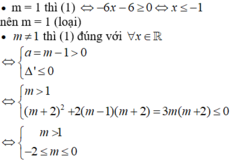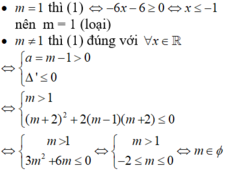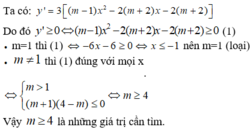
Hãy nhập câu hỏi của bạn vào đây, nếu là tài khoản VIP, bạn sẽ được ưu tiên trả lời.


- Ta có:

- Do đó:
 (1)
(1)

- Suy ra, không có giá trị nào của m thỏa mãn.
Chọn D.

- Ta có:

- Do đó y' ≥ 0 ∀x ∈ R(1).

- Vậy không có giá trị nào của m thỏa mãn.
Chọn D.

\(f\left(x\right)=ax^2+bx+c\) có 2 nghiệm thỏa mãn \(x_1< k< x_2\) khi và chỉ khi \(a.f\left(k\right)< 0\)
Đây là nguyên lý của tam thức bậc 2 từ lớp 10 thì phải
Phương Anh Đỗ
Nhìn đề đoán là \(y=\frac{1}{3}mx^3+mx^2+\left(m+1\right)x+2\)
\(y'=mx^2+2mx+m+1\)
a/ Với \(m=0\) thỏa mãn
Với \(m\ne0\) để \(y'>0;\forall x\)
\(\Leftrightarrow\left\{{}\begin{matrix}m>0\\\Delta'=m^2-m\left(m+1\right)< 0\end{matrix}\right.\) \(\Rightarrow m>0\)
b/ Để \(y'=0\) có 2 nghiệm trái dấu
\(\Leftrightarrow m\left(m+1\right)< 0\Rightarrow-1< m< 0\)
c/ \(\left\{{}\begin{matrix}\Delta'=-m>0\\x_1x_2=\frac{c}{a}>0\end{matrix}\right.\) \(\Leftrightarrow\left\{{}\begin{matrix}m< 0\\\frac{m+1}{m}>0\end{matrix}\right.\) \(\Rightarrow m< -1\)
d/ \(x_1< 1< x_2\)
\(\Rightarrow m.y'\left(1\right)< 0\)
\(\Leftrightarrow m\left(m+2m+m+1\right)< 0\)
\(\Leftrightarrow m\left(4m+1\right)< 0\Rightarrow-\frac{1}{4}< m< 0\)

3.
\(x-2y+1=0\Leftrightarrow y=\frac{1}{2}x+\frac{1}{2}\)
\(y'=\frac{2}{\left(x+1\right)^2}\Rightarrow\frac{2}{\left(x+1\right)^2}=\frac{1}{2}\)
\(\Rightarrow\left(x+1\right)^2=4\Rightarrow\left[{}\begin{matrix}x=1\Rightarrow y=1\\x=-3\Rightarrow y=3\end{matrix}\right.\)
Có 2 tiếp tuyến: \(\left[{}\begin{matrix}y=\frac{1}{2}\left(x-1\right)+1\\y=\frac{1}{2}\left(x+3\right)+3\end{matrix}\right.\) \(\Leftrightarrow\left[{}\begin{matrix}y=\frac{1}{2}x+\frac{1}{2}\left(l\right)\\y=\frac{1}{2}x+\frac{9}{2}\end{matrix}\right.\)
4.
\(\lim\limits\frac{\sqrt{2n^2+1}-3n}{n+2}=\lim\limits\frac{\sqrt{2+\frac{1}{n^2}}-3}{1+\frac{2}{n}}=\sqrt{2}-3\)
\(\Rightarrow\left\{{}\begin{matrix}a=2\\b=3\end{matrix}\right.\)
5.
\(\lim\limits_{x\rightarrow a}\frac{2\left(x^2-a^2\right)+a\left(a+1\right)-\left(a+1\right)x}{\left(x-a\right)\left(x+a\right)}=\lim\limits_{x\rightarrow a}\frac{\left(x-a\right)\left(2x+2a\right)-\left(a+1\right)\left(x-a\right)}{\left(x-a\right)\left(x+a\right)}\)
\(=\lim\limits_{x\rightarrow a}\frac{\left(x-a\right)\left(2x+a-1\right)}{\left(x-a\right)\left(x+a\right)}=\lim\limits_{x\rightarrow a}\frac{2x+a-1}{x+a}=\frac{3a-1}{2a}\)
1.
\(f'\left(x\right)=-3x^2+6mx-12=3\left(-x^2+2mx-4\right)=3g\left(x\right)\)
Để \(f'\left(x\right)\le0\) \(\forall x\in R\) \(\Leftrightarrow g\left(x\right)\le0;\forall x\in R\)
\(\Leftrightarrow\Delta'=m^2-4\le0\Rightarrow-2\le m\le2\)
\(\Rightarrow m=\left\{-1;0;1;2\right\}\)
2.
\(f'\left(x\right)=\frac{m^2-20}{\left(2x+m\right)^2}\)
Để \(f'\left(x\right)< 0;\forall x\in\left(0;2\right)\)
\(\Leftrightarrow\left\{{}\begin{matrix}m^2-20< 0\\\left[{}\begin{matrix}m>0\\m< -4\end{matrix}\right.\end{matrix}\right.\) \(\Leftrightarrow\left\{{}\begin{matrix}-\sqrt{20}< m< \sqrt{20}\\\left[{}\begin{matrix}m>0\\m< -4\end{matrix}\right.\end{matrix}\right.\)
\(\Rightarrow m=\left\{1;2;3;4\right\}\)

16.
\(y'=\frac{\left(cos2x\right)'}{2\sqrt{cos2x}}=\frac{-2sin2x}{2\sqrt{cos2x}}=-\frac{sin2x}{\sqrt{cos2x}}\)
17.
\(y'=4x^3-\frac{1}{x^2}-\frac{1}{2\sqrt{x}}\)
18.
\(y'=3x^2-2x\)
\(y'\left(-2\right)=16;y\left(-2\right)=-12\)
Pttt: \(y=16\left(x+2\right)-12\Leftrightarrow y=16x+20\)
19.
\(y'=-\frac{1}{x^2}=-x^{-2}\)
\(y''=2x^{-3}=\frac{2}{x^3}\)
20.
\(\left(cotx\right)'=-\frac{1}{sin^2x}\)
21.
\(y'=1+\frac{4}{x^2}=\frac{x^2+4}{x^2}\)
22.
\(lim\left(3^n\right)=+\infty\)
11.
\(\lim\limits_{x\rightarrow1^+}\frac{-2x+1}{x-1}=\frac{-1}{0}=-\infty\)
12.
\(y=cotx\Rightarrow y'=-\frac{1}{sin^2x}\)
13.
\(y'=2020\left(x^3-2x^2\right)^{2019}.\left(x^3-2x^2\right)'=2020\left(x^3-2x^2\right)^{2019}\left(3x^2-4x\right)\)
14.
\(y'=\frac{\left(4x^2+3x+1\right)'}{2\sqrt{4x^2+3x+1}}=\frac{8x+3}{2\sqrt{4x^2+3x+1}}\)
15.
\(y'=4\left(x-5\right)^3\)

Đáp án D
m > 1 m + 2 2 + 2 ( m − 1 ) . ( m + 2 ) = ( m + 2 ) .3 m ≤ 0 ⇔ m > 1 − 2 ≤ m ≤ 0 ⇔ ∃ m
Vậy không có giá trị nào của m thỏa mãn